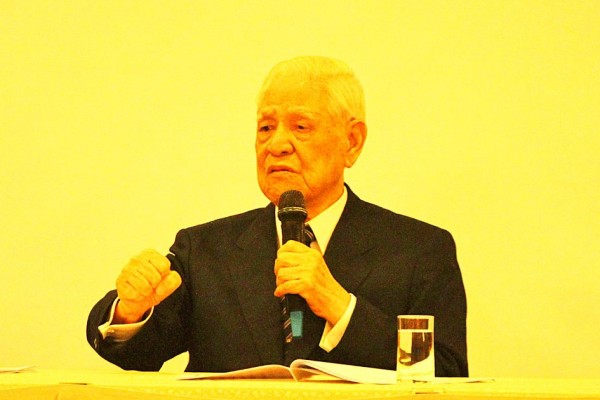《TAIPEI TIMES》Taiwanese identity crucial to facing threa

Former president Lee Teng-hui yesterday gives a speech at a seminar on national awareness held by the Presbyterian Church in Taiwan’s branch in Tainan. Photo: CNA
SYSTEMIC CHANGE: Ex-president Lee Teng-hui called on President Tsai Ing-wen to familiarize the public with the government’s proposed constitutional reform initiative
By Chen Wei-han / Staff reporter
To become a normal democracy, the nation has to build up its Taiwanese identity against Beijing’s threats from within and outside the nation, former president Lee Teng-hui (李登輝) said yesterday.
“The key to whether Taiwan can become a normal democracy and a leading international nation is based on whether improving the identity of ‘new Taiwanese’ succeeds,” Lee said at a convention of the Presbyterian Church in Tainan.
New Taiwanese are people who love the nation, prioritize its interests and support local democratic values, Lee said.
For the past five decades, China has been a constant threat to Taiwan, often seeking to infringe on or suppress Taiwanese sovereignty, Lee said.
Beijing is prepared to obstruct Taiwan’s democratization militarily, as it did during Lee’s term, when it launched a series of large-scale missile tests in the Taiwan Strait in the run-up to the 1996 presidential election, resulting in the Third Taiwan Strait Crisis, he said.
China has diversified its “united front” strategies by recruiting pro-unification supporters and sponsoring organized criminal activities in Taiwan to stir ethnic conflict and destabilize society, he said.
It also seeks to coerce Taiwan with economic manipulation, luring Taiwanese businesses from the nation to blunt the nation’s competitive edge, Lee said, adding that Taiwanese, while enjoying political freedom, are gradually losing economic autonomy to China.
“It is extremely irresponsible for any pro-Taiwanese leader not to take action against — or even to create — conflict between independence and unification groups,” Lee said.
“To overcome the challenge, the priority is to improve identification with Taiwan, where democracy is practiced. It is on such a basis that ethnic differences can be dissolved with democratization and anti-democracy politicians can no longer deceive the public with the fabricated ‘1992 consensus,’” he said.
The so-called “1992 consensus,” a term former Mainland Affairs Council chairman Su Chi (蘇起) in 2006 admitted making up in 2000, refers to a tacit understanding between the Chinese Nationalist Party (KMT) and the Chinese government that both sides of the Taiwan Strait acknowledge there is “one China,” with each side having its own interpretation of what “China” means.
The prosperity of a nation depends on a powerful leadership, a set of clearly defined goals and internal solidarity, Lee said.
The Democratic Progressive Party (DPP) for the first time won both the presidency and legislative majority in last year’s general elections, but its administration has been mired in growing public dissatisfaction, giving rise to the fear that a local administration might be replaced.
To prevent the “reinstatement of a Chinese administration,” such as the KMT regaining the government in 2008, the DPP government should ensure a properly functioning democracy and party system, prevent social division and proceed with reforms, Lee said.
He commended Premier William Lai (賴清德) for his insistence on Taiwanese independence, saying it is rare that a premier has the boldness to openly insist on independence.
Lai’s appointment has helped boost President Tsai Ing-wen’s (蔡英文) approval rating by 16 percentage points, and he is expected to lead economic development, Lee said.
He also called on Tsai to explain the DPP’s constitutional reform initiative to familiarize the public with the complicated issue, as DPP lawmakers have launched a proposal to amend the Constitution to pave the way for a pure presidential system.
新聞來源:TAIPEI TIMES




















